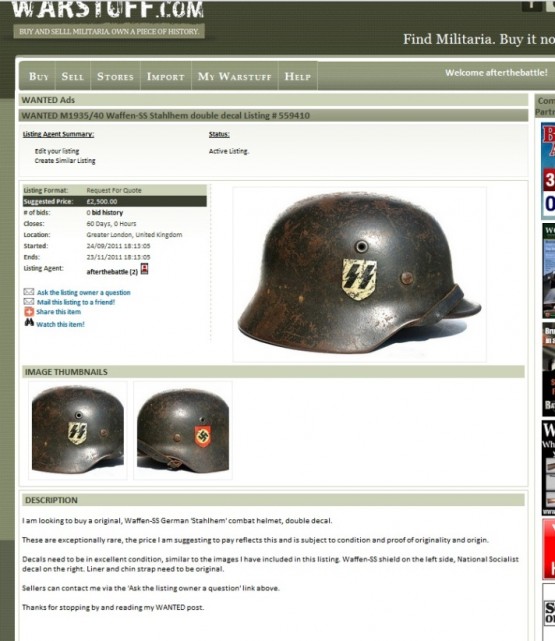
Understandably any German militaria connected with the criminal events of the 1930’s and 40’s is going to charge emotions. Many are horrified that such militaria is available on the open market today, and for no small price. So why collect it?
WARSTUFF WWII German MilitariaNot an unreasonable question given the brutal events surrounding World War Two, notable amongst them the war crimes committed by Germany in occupied territories. We all know and are repulsed by the appalling statistics surrounding the death of civilians due to disease, starvation, massacres, deliberate genocide and bombing at the hands of the Nazi’s. No surprise then that there is an image problem associated with collecting Nazi memorabilia. If you meet a serious collector with an interest in Nazi relics, then even the informed will find it challenging not to think differently about that person and wonder what their motivations are.
But here is the common misconception. Owning militaria pieces from this period doesn’t mean you hold Nazi or anti-Semitic views. Collecting pieces from World War Two Germany doesn’t mean your own work is informed by the Nazi items you seek out. Like any collecting passion, items mean different things to different people and for the main, serious collectors are historians, collecting German war relics for non-political reasons and driven by an enthusiastic interest in military events. Of course there are always exceptions to this – and like any passion, moderation is the operative word.
Here are the top five reasons we have heard from collectors why they buy Nazi relics:
(1) BUY THEM BECAUSE “to the victors belong the spoils of war”. Like any trophy the artefacts represent something hard won, something that people lived and died over. They represent Allied victory – the forces of good triumph over the forces of evil.
(2) BAD GUY’S STUFF is always cooler. The WWII German forces were no exception. There is no doubt about it, the engineering, design and manufacturing prowess of Germany as a nation was and still is unmatched. Antiques from this period have an aesthetic that appeal to many.
(3) WORLD WAR TWO is the greatest story on earth. Many collectors’ families were directly or indirectly affected by the events of the period. Many grew up with the story telling of their relatives. Collecting from this period brings collectors into contact with events and a force that was hated and feared for good reason. The force which drove a world to war can be now be displayed on a mantelpiece as a harmless talking point.
(4) BUY THEM AS an investment. Demand is rising, and prices for Nazi collectables are rising. Original collectables are becoming harder and harder to locate as more reproductions flood the scene. With growing interest in this chapter of history as the last veterans die out, prices reflect the shortage in supply.
(5) BUY THEM TO keep them out of reach of those who have the wrong ideologies. OK, so we haven’t met anyone who has bought Nazi relics for this reason, but the possibility is always there. There are many out there today that harbour views that would prevent you from pursuing such a collecting passion. The irony that the Nazi’s stood for limiting freedoms of all types seems lost on them.
So does an interest in Nazi paraphernalia matter? If you collect this stuff, should you be on the moral defensive? Whilst there is certainly an image problem with Nazi relics, if your reasons are non-political, the answer is quite simply, no. It would be like condemning someone for their passion in collecting any type of antique.
The German historians agree. In the last year two ground breaking exhibitions have been held in Berlin, each exploring the role of the Nazi’s in the state and the impact on German society. If Germany can deal with old taboos in a positive way, when it comes to attitude to collecting Nazi memorabilia, so can the general public.

